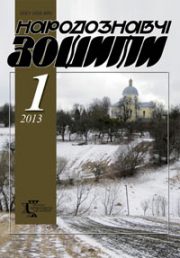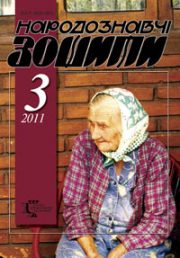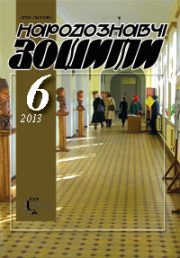2025 year, issue 2
The Ethnology Notebooks. 2025. # 2 (182). P. 249-
DOI https://doi.org/10.15407/nz2025.02
Articles
SHMAGALO Rostyslav
THE ROLE OF TARAS SHEVCHENKO IN THE SPACE OF UKRAINIAN ART EDUCATION
247—258
IVANNIKOVA Lіudmyla
SYMBOLIC FUNERAL IN UKRAINIAN PROTEST FOLKLORE: A TRANSFORMED TRADITION
423—438
SEREDA Oksana
THE VERSATILITY OF OLES STEPOVYI’S TALENT AS A JOURNALIST AND CRITIC
439—450
MUSHKETYK Lesia
MODERN FOLKLORE STUDIES AT THE BUDAPEST INSTITUTE OF ETHNOGRAPHIC RESEARCH
451—465
TEMCHENKO Andriy
MYTHOPOETIC AND MYTHOEROTIC SEMANTICS OF THE TALE «FOX AND CRANE»
466—481
Publications
Horbal Maria
Inscriptions on books (from the author’s private collection)
482—489
Conferences
Materials
Sydorenko Volodymyr
Peculiarities of using variable techniques for creating artistic leather products
494—500
In memoriam
Сокіл Василь
In memory of Heroes
501—502
Vasyl Sokil (1.10.1954 — 15.04.2025)
503—503
In memory of Vasyl Sokil
504—504






